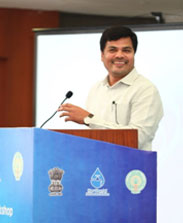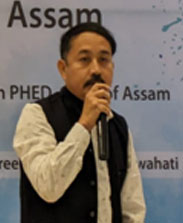Water is an indispensable resource for human development and social progress. Unfortunately, the lack of access to clean water and sanitation remains one of the most significant challenges worldwide, particularly in India. The primary burden of fetching water falls on the women of the village, who must endure hours of walking in the scorching sun while carrying litres of water.
With a firm commitment to improving the quality of life for millions in underserved communities, improving access to safe water remains a key focus area for the Tata Trusts. In pursuit of this objective, the Trusts have partnered with the Jal Jeevan Mission (JJM), the flagship initiative of the Ministry of Jal Shakti under the Government of India. JJM aims to provide Functional Household Tap Connections (FHTCs) to over 14 crore households in India by 2024 – an endeavour that will significantly enhance the quality of life for families in rural India.
While infrastructure and technological advancements undoubtedly play crucial roles in narrowing the water accessibility gap, the success of JJM ultimately hinges on both individual and community behaviour. To address this, the Trusts have implemented a Social Behavioural Change Communication (SBCC) campaign.
Effective SBCC campaigns utilise various channels such as interpersonal communication, print and digital media, and educational programmes to disseminate key messages, raise awareness, and promote behavioural change. They also consider cultural and social norms, tailoring messages to resonate with specific target audiences. Through strategic partnerships with local organisations, schools, and community leaders, SBCC initiatives can create lasting impact by driving behavioural shifts at the grassroots level.
The Trusts’ SBCC campaign – aptly named ‘Samman Connection’, is based on the universal truth that regardless of gender, age, caste or class, everyone desires respect. Through this campaign, the Trusts aim to promote behavioural change at three levels – individual, household and societal, thereby empowering rural populations to take ownership of their ‘sehat’ (health) and ‘samay’ (time) by making the most of the tap water connections in their homes.
In addition to educating communities about proper sanitation practices and responsible water management, the ‘Samman Connection’ campaign intends to leverage the power of digital media and tailor communication strategies to build an emotional connection with the community. The intent is to encourage communities to make the behavioural changes necessary to give the women in their villages a better quality of life. Access to clean, safe water will also lead to improved health outcomes for the villagers by reducing the incidence of waterborne diseases.
The concept of saving time through reduced drudgery for women and saving money through reduced medical expenditure will allow a rural family to progress and achieve ‘samman’, thus cascading this prosperity through entire villages and communities. With this key insight in mind, the ‘Samman Connection’ campaign was conceptualised to encourage the adoption, appreciation and celebration of tap water connections in rural households.
The campaign thereby aims to enhance the value of a tap water connection by addressing four major aspects of water in rural communities, viz., the importance of access to safe & potable drinking water, the role of women in water management, the importance of community ownership and the benefits of paying for the maintenance bill of tap water connections. The campaign seeks to instil a sense of ownership at the community level itself, where individual households learn to treat their JJM-provided FHTC as their own and use water responsibly.
These messages, in their entirety, have been featured in an animation-style film with powerful lyrics, music and soundtrack. This film is supplemented with four short films that aim to engage viewers on issues and concerns that impede the uptake of tap water connections in rural India. These elements have been visualised through unique animation that appeals to young and old alike, cutting across cultures and languages.
By driving behavioural shifts at the grassroots level, the Tata Trusts hope to continue building resilience among communities and make them water-independent.
Stakeholders’ views
 |
"Tata Trusts and VCF spearheading a Social and Behavioural Change Communication (SBCC) campaign named ‘Samman Connection’ enhanced the Government's Jal Jeevan Mission programme, embodying a commitment to sustainable water solutions, community empowerment, and innovative approaches for a water-secure future."
Mr B Hare Ram Naik, Project Director, SWSM (State Water and Sanitation Mission) under the RWS&S (Rural Water Supply and Sanitation) Department, Government of Andhra Pradesh
 |
"Through the innovative Social Behavioural Change Communication campaign crafted by Tata Trust and CML, the hearts and minds of the community resonated with the vision of Jal Jeevan Mission, fostering a collective eagerness to choose tap connections as the lifeline to a brighter, water-secure future in Assam."
Shri Anup Kr Brahma (ACS), Jt. Mission Director, Jal Jeevan Mission, Assam
 |
"Tata Trusts’ Samman Connection, a Social and Behavioural Change Communication (SBCC) campaign is being executed by Himmotthan Society in the project area of Tehri Garhwal, Uttarakhand to amplify the objectives of the Government's Jal Jeevan Mission programme. The SBCC campaign connects with communities and will ensure the commitment of various stakeholders to attain sustainable potable water solutions for the communities."
Mr Keshwanand Semwal, Executive Engineer - Uttarakhand Jal Nigam, Nodal Officer – Jal Jeevan Mission, Tehri, Uttarakhand
This article, written by Divyang Waghela and Deepshikha Surendran, Tata Trusts, was first published in Jal Jeevan Samvad in January 2024.
